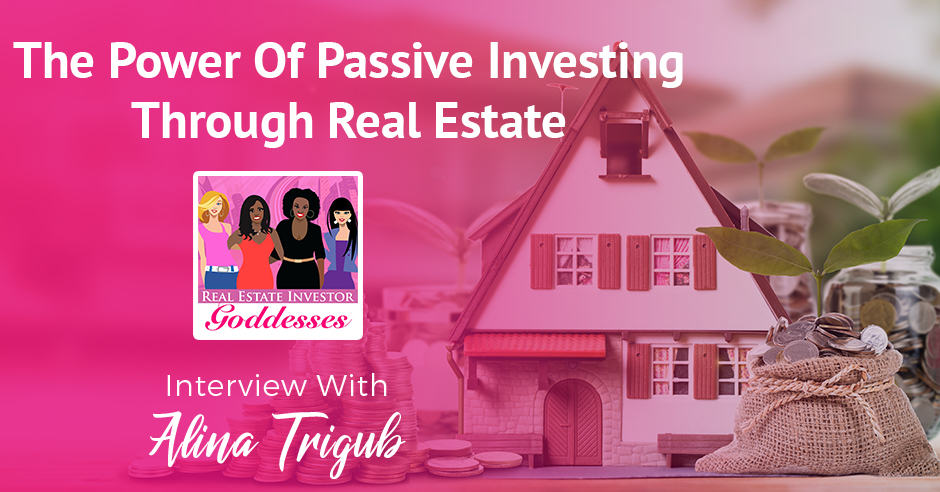
Real estate can be a never-ending source of investment as long as you know its ins and outs. In this episode, Monick Halm sits down with Alina Trigub, the founder and managing partner of SAMO Financial. Alina shares to us how her fascination in syndication that made her become a successful real estate investor. When starting a syndication, she notes that there are three things to keep an eye on. Alina shows us how she got into investing in mobile home parks and different asset classes, particularly senior living. She also emphasized the importance of due diligence before making the jump on deals.
—
Listen to the podcast here:
The Power Of Passive Investing Through Real Estate – Interview With Alina Trigub
I am excited to have the incredible Alina Trigub with us. She’s the Founder and Managing Partner of SAMO Financial. It’s a boutique private equity firm specializing in helping a select group of people with real estate investing through wealth preservation and tax strategies. She’s the Founder of two Meetup groups in New York and New Jersey named, The Power of Passive Investing (Through Real Estate). In addition, she offers educational webinars and collaboration with various administrators of self-directed IRA companies and she’s helped her clients to acquire and invest in over 1,187 apartments, over 500 storage units and over $5 million in mobile home parks. I’m excited to have her with us. Welcome, Alina.
Thank you, Monick. It’s a pleasure to be here.
It’s a pleasure to have you here. You’re going to be excited by what she has to share with us. Alina, thank you again.
It’s fun talking to you. It’s a pleasure to be here, Monick.
The pleasure is all mine. In this show, we always share stories of how you got started. How did you get started in real estate investing?
My name is Alina Trigub. I started out years ago but let me give you a little history of what was before that. I started my career as a tax accountant with Ernst & Young many moons ago. I never liked accounting, I left the field and went into software development. While I was in software development and in the corporate world, I realized that we’re all, for the most part, dealing with other people. In order to achieve anything in this life, you need to be able to work with any people and be the people person. That’s the most important thing.
Do not jump into every single deal. Make sure that the deal can sustain the economy. Click To TweetWhile working in my corporate career, I was always looking for ways to save on taxes, preserve wealth and find sources of passive income. I always thought of real estate but haven’t taken action for a long time. Finally, I decided to take action and started doing my research. My research came across the world of syndications. The topic and the way the niche itself looked is incredibly interesting. I started to dig in further. Finally, I took an action and invested in my first syndication as an equity partner, limited or passive investor or equally identical terms.
I was fascinated how great it was. I was considered a real estate investor. I was saving in taxes, preserving my wealth and getting passive income. All I had to do is to take the brochure about the investment itself, review it, do my research on a syndicator, on a market and then investment itself and that’s it. I have to decide if I want to invest in it and after that, my job was done. Doing that research, I felt that it was a secret that nobody knew that no one was sharing and I wanted to change that. Out of it, an idea of my own company was born. I started my own company, SAMO Financial, that concentrate on purely helping other people to passively invest in real estate and do it without any interruption to their daily life. Other folks can also preserve their wealth, save on taxes and make some passive income on the side. That’s what I’ve been doing ever since.
You found out about this and you were thinking about it for several years. What made you do the jump? What made you finally take action?
When I did enough research and analysis, enough in my eyes of course, having an accounting background makes me more of being an analysis-paralysis person. When I felt it was enough, when I learned about the deal sponsor, the deal itself and the market and felt comfortable with the overall package, all of the three components, then I decided that I can do the jump. In addition to that, I asked for opinion from other people that have been investing for a while. I asked for their opinion as well on a deal and when I got a green light, I went into it. I have to admit that after the first one, it became relatively easy. The first one was the hardest because it was like jumping into the ocean for the first time. There’s so much unknown. After that, the second, the third and so forth came naturally that I don’t even remember much about it. I only remember about the first one for the most part. I think that’s true about other people that are investing in real estate. Whatever niche they’re in, you always remember your first one. After that, it blends in.
That first one when you finally dipped in your toe, you’ve been looking at the water and finally you’re like, “I’m ready to dive,” and you do it. You realize that it is great. That’s why I’m a big fan of syndication. I’m a syndicator myself. Three things that you said that I want to highlight which are important for people who are thinking about syndicating is you look at the three perfect things. The first thing is the syndicators themselves. Who are the people doing the deal? Are you feeling comfortable with them? They are running your deal and they’re the most important component. Looking at the market if it’s a good component and then looking at the actual property and that deal and then their plan around the deal. All those three things in that order, that’s what you need to know. What are you working on?
I’m not working on anything specifically, but I’m evaluating several deals to see whether they potentially fit for my investors. The way I work, to explain to your audiences, a lot of deals come my way and I evaluate them for all of the same things, the deal sponsor, the market and the investment itself. When all of the three components check off in my view and when I think that they have enough investors for this deal, I would go and jump into it and decide to invest personally and bring my investors to the deal. I do evaluate a lot of deals, but I don’t jump into a lot of them because given where we are in the market, I’m trying to be more cautious and not jump into every single deal. I make sure that the deal can sustain economy. Only in that case will I jump on it and decide to work and bring my investors in.

Real Estate Passive Investment: Whatever your niche is in real estate, you will always remember your first client.
For us, maybe 1 out of every 8 or 9 deals we’ll say yes to. You’ve done a couple of different asset classes. You’ve done apartments, mobile home parks and self-storage. Why do you like those particular asset classes and what are you liking?
When I originally started out, I started this multifamily like everyone else. For me personally, it was too close to home. I lived in apartment buildings in the past and I knew the asset classes inside out. I knew what to expect and how to look at it and evaluate. When I see a typical bread and butter multifamily, and when I say bread and butter, I mean these two extremes, the bad neighborhoods and the good neighborhoods. The bread and butter are where the working class lives and where people will always need to live because they need roof on their heads. Those are the type of apartments that they want. Close to highways, close to shopping, access to major metro areas, access to major industries, major jobs and so forth.
After I invested in a few multifamily and after speaking to a few of my investors, I realized that now it was time to diversify and bring in more asset classes in. The next asset class I looked at was self-storage. I took my time to evaluate it and see whether the self-storage was the asset that we wanted to invest in. It looked like it was one of the safest asset classes that performs much better than other asset classes during the recession so we decided to jump on that. The last one we jumped on was mobile home parks. I took time to evaluate it. I found out that the notion that everyone has, that mobile home parks have these dilapidated houses, that they’re going to collapse the next time the wind comes their way is not true at all. They are different and they look like a typical home, it’s just a lot more compressed. They offer homes to people that cannot afford high rent prices in the expensive areas, places like Arizona for example.
These mobile home parks do well. These are nice communities of families and senior citizens that live in them for a long time. When these mobile homes are owned by the tenants, they look even better because the tenants feel the pride of ownership and they want to make them look good. Those are the type of mobile homes and mobile home parks communities that we normally go in. If the park is owned by the park itself, then what we try to do is we try to offer them to the tenants to make sure that the tenants buy them and then start preserving them as something of their own.
Those are the asset classes that I jump in. I started researching a new asset class, senior living. I haven’t made the move or the jump yet. I’m still more or less in the research phase. That’s potentially another asset class that I’m looking into. The number of aging population is increasing all the time and there are a lot more opportunities even locally for me in New Jersey to potentially invest in something local because I haven’t had much luck yet. Everything else that we own is someplace else, more or less southeast. It would be great to have an investment closer to home. I’m thinking that if it’s a senior living, potentially we may find something close to home and invest here as well.
A lot of good cashflow asset classes that you’re into and it’s great to hear your thinking process behind the different asset classes that you’re into. Let’s switch gears a little bit. I always ask my guests what was your biggest mistake and what did you learn from it. We learn so much more when things don’t go right. What was your biggest mistake and what did you learn from it?
Always be persistent, educate yourself, and surround yourself with people that have the drive and desire to succeed. Click To TweetBefore I became a real estate investor, we bought a property in the Philly area and we jumped on it, my husband and I, because our friends were buying. We didn’t do much research or analysis. Our friends were buying, it looked like a good market, good opportunity so we jumped on it. We went through evictions, court orders, stolen pipes, property been broken into, everything, you name it. It was a good learning curve experience. We lost on the property, but we were happy when we got rid of it. After that, I learned that whatever you do, make sure you do due diligence and put enough time and effort into analyzing it before making the jump.
Due diligence is key and for those who may not know exactly what due diligence is, that’s checking into the property and the team before you purchase, especially when you come from expensive areas like we do. You’re in New Jersey, New York and Los Angeles. It’s an expensive area. Sometimes when you come from these expensive areas, your eyes get big because the prices are cheap in comparison and you go, “I can buy ten of these.” You get excited by the cheap price tag, but then you end up buying yourself quite a big problem. It’s important to do due diligence on the area and make sure it’s a nice area and the property itself. On the flip side of your biggest mistake, what are you most proud of?
I would say the new friends that I found in the world of real estate. I made many new friends and potential partners that I could never think of. Just like the old saying goes, “You are the total of the five people that surround you.” I can proudly say that I have much more than five people around me that are strong, great friends, supporters, investors and people I can always call upon if I have any questions or need support or anything and vice versa. We’ll help each other. We call it Mastermind. It’s not a mastermind in a typical sense of the word, but it’s still a mastermind for us because we jump on the phone every month and we talk to each other. We help and support each other in any way we can. I’m happy about that.
I have to say, I love real estate people too. There’s something about real estate people. Wherever you are in the country, whether you have different politics, there’s something I love about them. To what do you attribute your success?
I would say persistence, dedication and never giving up, always moving forward.
That’s probably the key to success for everybody. What advice do you have for a woman who’s starting out in this field?

Real Estate Passive Investment: Make sure you do due diligence and put enough time and effort into analyzing a deal before making the jump.
I would say the same thing. Be persistent, educate yourself and surround yourself with people that have the drive and desire to succeed, that know why they are doing it and will never give up no matter what.
That part about surrounding yourself with great people is important. It does make a difference. The masterminding is also valuable and helpful for just about anyone. What do you wish you’d known at the beginning that you now know?
I wish I knew that this field is not as scary and unachievable as a lot of people think. Stay true to the course and continue moving forward. Regardless whether you take baby steps or large steps, keep moving forward and you will get to your final destination no matter how long it takes. Just stay true to the course.
It’s not as scary as you think. You can do this. I would also add something that you did at the beginning which was, get educated and learn what you can before. It’s not so much if you don’t take action, because it is important that you dive in and you’d take some steps. Once you’re educated, that’s the key. Before we get into our famed end of show trinity, which is our brag, our gratitude and our desire, what is the best way for people to connect with you?
They can find me on social media through my website, SAMOFinancial.com. My email is [email protected] or on LinkedIn or Facebook.
Now it’s time for your trinity, what is your brag?
If you look at my business card, it has Warren Buffett’s expression that says, “Someone is sitting in a shade today because someone else had planted a tree a long time ago.” I try to live by that expression. Every time I help someone, whether it’s an investor who is getting passive income, or someone in real estate starting out or intermediate or whatever else, the sense of gratification is always something that I enjoy getting.
An abundant mindset is not what you don't have but what you have and it's how you perceive it. Click To TweetIt’s well-bragged. It’s awesome how you are helping many other people planting all those trees. What are you grateful for?
I’m grateful for my family, my husband and my kids. I would not be here without their help and support.
Last but not least, what is one thing you desire?
My biggest desire is for everyone to have an abundance mindset. It’s important for people to understand that the abundance mindset, it’s not what you don’t have, it’s what you have and it’s how you perceive it. The relationship and the conversations we have about money is a lot more impactful than we think they are. If you concentrate on the positive and if you concentrate on saying, “I already have what I needed to have. I’m grateful for everything I have a life,” it will come to you naturally. It’s not a magic bullet, but you need to put in the hard work. Changing your mindset and saying that your glass is half full rather than half empty will definitely set you on the right road. You’ll be able to see the light at the end of the tunnel much faster.
Your desire is for everyone to have more abundance mindset. So shall your desire be or so much better than you can imagine under grace and in perfect ways. I love that trinity and I love having here.
It’s my pleasure.
Thank you again, Alina. That was amazing. Thanks to all the followers out there. You can connect with Alina Trigub on social media or at SAMOFinancial.com. You can connect with me at REIGoddesses.com. Click on Investor Club and get on the list to find out about our passive investing opportunities and about different events that are coming up. Subscribe to this podcast so you can get more amazing episodes.
Important Links:
- SAMO Financial
- The Power of Passive Investing (Through Real Estate) – New York
- [email protected]
- LinkedIn – Alina Trigub
- Facebook – Alina Trigub
About Alina Trigub
 I love helping people! I get a feeling of complete satisfaction and accomplishment when my investors find the investments that suit their goals and plans. I help a select group of people build wealth for them, their families and generations to come by passively investing in commercial real estate syndications. We invest in assisted living, multifamily, mobile home parks and storage.
I love helping people! I get a feeling of complete satisfaction and accomplishment when my investors find the investments that suit their goals and plans. I help a select group of people build wealth for them, their families and generations to come by passively investing in commercial real estate syndications. We invest in assisted living, multifamily, mobile home parks and storage.
I also enjoy connecting people. Since I network a lot, I make it a point to connect the people that I feel will benefit from connecting with each other. A number of these introductions turned out to be pretty beneficial for the folks I connected. Always happy to serve others!






blog3005.xyz
April 12, 2020 2:34 amAfter looking at a handful of the blog posts on your website, I really like your technique of writing a blog.
I book marked it to my bookmark website list and will be checking back in the near future.
Please visit my web site as well and tell me what you think.